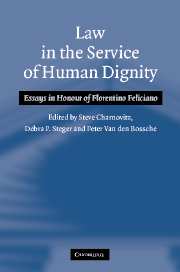Book contents
- Frontmatter
- Contents
- List of contributors
- Preface
- Biographical note
- List of abbreviations
- PART I Reflections on the contributions of Florentino Feliciano to international law
- PART II Insights into the World Trade Organization
- 5 Justice Feliciano and the WTO environmental cases: laying the foundations of a ‘constitutional jurisprudence’ with implications for developing countries
- 6 International trade law, human rights and theories of justice
- 7 Developing countries and the international trading system
- 8 North–South issues of foreign direct investments in the WTO: is there a middle-of-the-road approach?
- 9 The participation of developing countries in WTO dispute settlement and the role of the Advisory Centre on WTO Law
- 10 Reform of the WTO dispute settlement system: what to expect from the Doha Development Round?
- 11 Interpretation and Application of WTO Rules: Florentino Feliciano and the First Seven
- 12 Dispute settlement in the WTO: on the trail of a court
- 13 A proposal to introduce an Advocate General's position into WTO dispute settlement
- 14 Arbitration at the WTO: a terra incognita to be further explored
- 15 The challenges to the legitimacy of the WTO
- 16 The World Trade Organization after Cancún
- PART III The changing landscape of investment arbitration
- PART IV New challenges in international adjudication
- Bibliography of works by Florentino Feliciano
- Index
8 - North–South issues of foreign direct investments in the WTO: is there a middle-of-the-road approach?
from PART II - Insights into the World Trade Organization
Published online by Cambridge University Press: 29 July 2009
- Frontmatter
- Contents
- List of contributors
- Preface
- Biographical note
- List of abbreviations
- PART I Reflections on the contributions of Florentino Feliciano to international law
- PART II Insights into the World Trade Organization
- 5 Justice Feliciano and the WTO environmental cases: laying the foundations of a ‘constitutional jurisprudence’ with implications for developing countries
- 6 International trade law, human rights and theories of justice
- 7 Developing countries and the international trading system
- 8 North–South issues of foreign direct investments in the WTO: is there a middle-of-the-road approach?
- 9 The participation of developing countries in WTO dispute settlement and the role of the Advisory Centre on WTO Law
- 10 Reform of the WTO dispute settlement system: what to expect from the Doha Development Round?
- 11 Interpretation and Application of WTO Rules: Florentino Feliciano and the First Seven
- 12 Dispute settlement in the WTO: on the trail of a court
- 13 A proposal to introduce an Advocate General's position into WTO dispute settlement
- 14 Arbitration at the WTO: a terra incognita to be further explored
- 15 The challenges to the legitimacy of the WTO
- 16 The World Trade Organization after Cancún
- PART III The changing landscape of investment arbitration
- PART IV New challenges in international adjudication
- Bibliography of works by Florentino Feliciano
- Index
Summary
Introduction
As yet there is no agreement on foreign direct investment (FDI) in the WTO. As discussed later, however, the Ministerial Conference held in Doha in the autumn of 2001 adopted a resolution that there would be a negotiation on investment if consensus is achieved on the ‘modalities’ of negotiation. It is too premature to predict whether there will be such an agreement and, if there is, what shape this will take. However, globalization has progressed at an unprecedented speed in the past several decades and FDI has been one of the prime movers of globalization of the world economy. This necessitates some considerations for a comprehensive international agreement on FDI.
However, there is a sharp division of views with regard to the desirability of introducing a comprehensive agreement on FDI in the WTO. There are divergent views even among developed country members and among developing country members – one cannot easily draw a line between developed and developing country members and say that the former are for an FDI agreement and the latter are against it. Nevertheless, it is true that a sceptical sentiment on a comprehensive FDI agreement in the WTO is more prevalent among developing country members and, if the WTO is to incorporate an agreement on FDI in a future round, a compromise of the differing views of developed and developing country members must somehow be forged.
- Type
- Chapter
- Information
- Law in the Service of Human DignityEssays in Honour of Florentino Feliciano, pp. 76 - 89Publisher: Cambridge University PressPrint publication year: 2005
- 1
- Cited by

